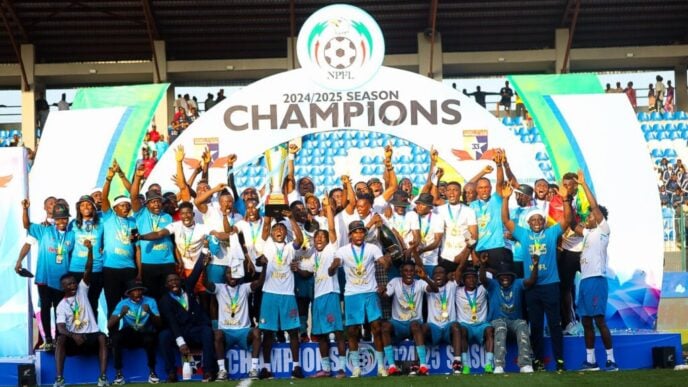Biodun Oyebanji
I belong to several Ekiti-focused WhatsApp groups where I regularly track political discussions. In the past month or two, one topic has dominated the chatter: the 2026 governorship election—and more specifically, the reelection of Governor Biodun Abayomi Oyebanji (BAO), who is currently serving his first term until October 2026.
From artisans’ associations to former governors, senators, councilors, religious groups, and even traditional rulers, the wave of endorsements under the banner “BAO till 2030” has been striking. By now, I’ve lost count of the individuals and groups publicly throwing their support behind the governor.
One of the initial concerns when BAO took office in October 2022 was how he would manage his relationship with his predecessor, Dr. Kayode Fayemi. Given how strained such relationships can become—as we’ve seen in Rivers State (Fubara vs. Wike) or Kaduna (Uba Sani vs. El-Rufai)—rumors were unsurprisingly rife. But BAO was quick to shut down any attempt to frame his administration as separate from Fayemi’s. “We are one,” he emphasized at a stakeholders’ meeting in 2023, calling his administration “an offshoot” of Fayemi’s.
Fayemi, in turn, gave a ringing endorsement of BAO’s leadership publicly “as early as” December 2024, and that he and his entire family would support BAO’s second term bid.
Advertisement
Despite these high-profile endorsements, some opposition—ironically, from within BAO’s own political party—has emerged. These dissenters allege that the governor is using state resources to fuel an orchestrated endorsement campaign, closing off the democratic space in the process. A widely circulated publication by these aggrieved party members accused BAO of setting up a 24-member adoption committee and manipulating party structures to secure his reelection.
But these claims seem to ignore both his political temperament and track record. Since winning the APC primary in January 2022, BAO has consistently positioned himself as a bridge-builder. He reached out to fellow aspirants—both within and outside his party—and even cautioned his supporters against disrespecting Engr. Segun Oni of the Social Democratic Party (SDP), who challenged the 2022 election results all the way to the Supreme Court. After the verdict, BAO described Oni as “my leader and brother,” a reflection of his inclusive, mature approach to politics.
For those who know him well, the words “desperate” or “undemocratic” feel misapplied to a man who has served Ekiti for over two decades with steady calm.
Advertisement
That said, my concern is not about the endorsements themselves, but the political tunnel vision they may cause. We risk being so swept up in campaign momentum that we forget to critically assess governance. Endorsements are fine—democracy thrives on choice and participation—but the greater question must remain: What has been achieved?
I studied the transition committee report that ushered in the BAO administration in October 2022, and one of the key recommendations was for the new administration to work towards achieving a 50-50 split between recurrent and capital expenditures. At the time, recurrent spending took about 70% of the state spendings, and the committee advised an additional 5% vote to capital expenditure each fiscal year. By 2025, under BAO’s leadership, capital expenditure now accounts for 49% of the budget—showing clear alignment with reform goals. This meant the state would achieve more on infrastructural development. In the last two and a half years, over 200 kilometers of road projects have been launched, including flyovers and a ring road. There have been over 40 electricity infrastructure projects, including an Independent Power Plant (IPP). At least, 140 classrooms have been either constructed or rehabilitated across the state. If you move around the local areas, there are over 60 primary healthcare centres that have been either constructed or rehabilitated, not leaving behind all the General Hospitals and the state university teaching hospital that have received upgrades. Over 2,000 hectares of lands have been allocated to farmers and agribusiness owners, and the government also provides a 50% subsidy on tractorization and even on seedlings. The series of meetings BAO had with the defence and army chiefs have now led to the establishment of the Nigerian Army 148 Battalion in Ikere. The Agro Marshals was also established to look after our farmers on their farmlands and our schools in rural areas. Need I mention that there has been an increment in security funds to the local government areas (LGAs).
Few weeks ago when the federal government approved the ‘Nigeria First’ policy to prioritise local goods in government procurements, I quickly noted how BAO had, since last year, signed the Local Content Law which demands that 40% of the total workforce, procurement of labour, goods, and services in any contract must be locally sourced from Ekiti. There is also a Wealth Fund Law the governor signed in 2023, establishing a Fund to build a savings base for the state. This was designed to look like Nigeria’s Sovereign Wealth Fund. It’s no news that the government, under the BAO administration, already got approval for the African Development Bank (AfDB) ‘$80 million investment loan for the Ekiti Knowledge Zone’. Although the governor had always told pensioners that payments of their pensions should not be seen as a favour, but rather their entitlement, these old people choose to see this as something “big”. About N26.6 billion has been paid in pension and gratuity to 15, 627 pensioners since BAO came in. Guess what?
These pensioners have also joined in endorsing BAO for reelection. According to them, “all members collectively agreed to endorse Oyebanji, because he initiated regular payments of monthly pension, gradual liquidation of the inherited gratuities, payment of pension arrears and payment of a ₦10,000 palliative fund to our members.” I assure you that this is the organic foundation all of these endorsements stem from.
Advertisement
Interesting to note that all of these are happening as the government continues to open its books in an exceptionally transparent manner. It’s no surprise that Ekiti State consistently ranks first on the fiscal transparency index, as reaffirmed in the recently published Q4 report by BudgIT.
While the political excitement surrounding BAO’s reelection is understandable—especially in a clime where leaders are often kept at arm’s length by their sulking predecessors and disappointed constituents—we must resist the temptation to view endorsements as the main metric of success.
Elections are about choice, but leadership is about delivery.
The real case for BAO’s second term is not found in slogans or WhatsApp group debates, but in the roads, classrooms, health centres, laws, and policies that now dot the Ekiti landscape. Before we get carried away with the re-election chant, let us also remember to measure what matters: governance that improves lives.
Advertisement
And on that score, BAO has made a strong argument—through action, not just applause.
Owolabi, a research assistant to Oyebanji, writes from London, UK
Advertisement
Views expressed by contributors are strictly personal and not of TheCable.













